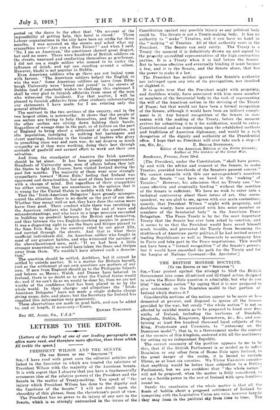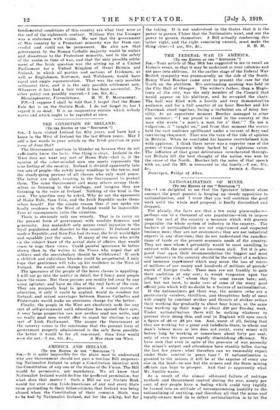LETTERS TO THE EDITOR.
[Letters of the length of one of our leading paragraphs are often more read, and therefore more effective, than those which fin treble the space.)
PRESIDENT WILSON AND THE SENATE.
(To THE EDITOR OF ens " SPECTATOR."I SIR,—I have read with great care the editorial articles published in the Spectator in which are treated the relations of President Wilson with the majority of the American Senate. It is with regret that I observe that you have a fundamentally erroneous idea of the relative powers of the President and the Senate in the matter of Treaty-making. You speak of "the injurywhich President Wilson has done to the dignity and the functions of the Senate." I will not dwell upon the absurdity of this phrase, from the rhetorician's point of view.
The President has no power to do injury of any sort to the Senate, Which is as strongly entrenched in the terms of the
Constitution against any possible injury as any political body could be. The Senate is not a Treaty-making body. It has no authority to " make " Treaties, and it can have no hand in the " making " of Treaties. All of that authority rests in the President. The Senate can only ratify. The Treaty is a Treaty the moment it is definitively drawn up and signed by the properly accredited representatives of the high contracting parties. It is a Treaty when it is laid before the Senate. But to become effective and eventually binding it must become a law, and it is the Senate, and the Senate alone, that has the power to make it a law.
The President has neither ignored the Senate's authority nor infringed upon any iota of its prerogatives, nor insulted or slighted it.
It is quite true that the President might with propriety, and doubtless wisely, have associated with him some member or members of the Senatorial bodyin the task of representing the will of the American nation in the devising of the Treaty of Peace; but that would not have been a formal recognition of the Senate, although it would have been an indirect compliment to it. Any formal recognition of the Senate in connexion with the making of the Treaty, before the moment arrives for submitting it to it for ratification, would be extraConstitutional and an innovation upon the established methods and traditions of American diplomacy, and would be a rash derogation of the dignity and authority of the Presidential office. I hope that no President will ever take such a step.-1
am, Sir, &c., R. BRIGGS DAVENPORT, Editor of the American Edition of the Petite Gironde; Author of The Genesis of the Great War. Bordeaux, France, June 23rd.
LThe President, under the Constitution, "shall have power,
by and with the advice and consent of the Senate, to make Treaties, provided two-thirds of the Senators present concur." We cannot reconcile with this our correspondent's assertion that the Senate "can have no hand in the 'making' of Treaties." However, his admission that no Treaty can "become effective and eventually binding" without the sanction of the Senate is sufficient. We have no wish to enter into a technical controversy about these terms of art. Our correspondent, we are glad to see, agrees with our main contention; namely, that President Wilson "might with propriety, and doubtless wisely, have associated with him some member or members of the Senatorial body" in the American Peace Delegation. The Peace Treaty is by far the most important Treaty that the Senate has ever been asked to sanction, and it seems to us that the President would have saved himself much trouble, and prevented the Tzeaty from becoming the shuttlecock of American party politics, if he had invited several leading Republicans as well as Democrats to accompany him to Paris and take part in the Peace negotiations. This would not have been a "formal recognition" of the Senate's powers, but it would have smoothed the path for the Treaty and for the League of Nations Covenant.—En. Spectator.] THE BRITISH MONROE DOCTRINE. [To THE EDITOR OF THE "SPECTATOR."] SIR,—Your protest against the attempt to bluff the British Government into some ill-advised and ill-timed action designed to solve the Home Rule question is admirable, but why do you libel "the whole nation " by saying that it is now prepared to give autonomy on the Dominion model to that portion of Ireland which desires it ?
Considerable sections of the nation appear to be more or less
demented at present, and disposed to ignore all the lessons provided by the war, but surely "the whole nation " is not so affected by suicidal mania as to be prepared to hand over fivesixths of Ireland, including the harbours of Dundalk, Drogheda, Dublin, Kingstown, Queenstown, itc., &e., and containing at least five hundred thousand loyal subjects of the King, Protestants and Unionists, to "autonomy on the Dominiont model"; that is, to a Government under the control of the enemies of this kingdom, endowed with all the machinery for setting up an independent Republic.
The correct summary of the position appears to me to be
this, that if the British Parliament is so misled as to inflict Dominion or any other form of Home Rule upon Ireland, to the great danger of the realm, it is bound to exclude Ulster, or at least six counties. We Ulster Unionists consider that anything would be better than subjeotion to a Dublin Parliament, but we are confident that "the whole nation" will not be prepared, when the matter is fully considered, to set up a hostile power in the rest of Ireland with open frontiers round us.
Surely the conclusion of the whole matter is that all the floods of babble about a proposed settlement of Ireland by tampering with the Legislative Union are vain, however largely they may loom in the political sky from time to time. The
funtlainental conditions of this-country are what they were at the end of the eighteenth century. William Pitt the Younger was statesman with vision. He -saw that the government of this country by a Protestant minority was far from successful and Could not be permanent. He also saw that government by the Roman Catholic mijority would be unfair and disastrous. to the Protestant minority, and to the safety of the realm in time of war, and that the only possible settlement of the Irish question was the setting up of a United Parliament for a United Kingdom of Great Britain and Ireland, in which all parties . and sections of Irishmen, as well as Englishmen, Scotsmen; and Welshmen, would have equal and ample representation. That was the only possible settlement then, and it is the only possible settlement now. Whenever it has had a fair trial it has been successful. No other policy can possibly succeed.—I am, Sir, &c., Blessingbourne, Firemiletown. H. W. F. MONTGOMERY. • suppose I shall be told that I forget that the Home Rule Act is on the Statute Book. I do not forget it; but I regard it as dead. It is an inoperative statute which nobody wants and which ought to be repealed at once.















































 Previous page
Previous page